Plot summary
The repellently fat Mr. Pyecraft is a patron of a London club, who usually pesters Mr. Formalyn, to the point that the latter eventually decides to write Pyecraft's true story, for revealing an unbelievable, yet embarrassing, secret which is shared by both.
In the beginning of Formalyn's account, the rotund Pyecraft usually annoys him, with his boring stories and particularly about his obesity troubles. Eventually, Formalyn brings an occult weight-loss recipe of his Hindustani great-grandmother, and Pyecraft tries it for some time. Then, Pyecraft telegraphs Formalyn at the club, calling him to Pyecraft's house in Bloomsbury, where the housekeeper tells him that Pyecraft has been cloistered in his own living room for the last twenty-four hours. There, he is found, as rounded as ever, floating helplessly in the air, against the ceiling. They conclude that the recipe has literally reduced his weight, not his fatness.
Formalyn assists with various ingenious devices and techniques to allow Pyecraft to traverse his room while floating. For example, Pyecraft gets down from the bookcase by taking out a couple of heavy tomes of the Encyclopædia Britannica. Some time later, it occurs to Formalyn that Pyecraft's garments could be stuffed with heavy lead pieces to keep him on the ground; he even remarks that Pyecraft could sail without fear of a shipwreck, for he could just hover ashore after removing some of the weight.
Pyecraft returns to the club with Formalyn's assistance, though without change to his porcine habits. Initially, the two of them agree to keep the embarrassing secret of Pyecraft's weightlessness, but the obsessive Pyecraft soon starts to annoy him too much.

Herbert George Wells was an English writer. Prolific in many genres, he wrote more than fifty novels and dozens of short stories. His non-fiction output included works of social commentary, politics, history, popular science, satire, biography and autobiography. Wells is now best remembered for his science fiction novels and has been called the "father of science fiction."

Anna Katharine Green was an American poet and novelist. She was one of the first writers of detective fiction in America and distinguished herself by writing well plotted, legally accurate stories. Green has been called "the mother of the detective novel".

"The Land Ironclads" is a short story by British writer H. G. Wells, which originally appeared in the December 1903 issue of the Strand Magazine. It features tank-like "land ironclads," 80-to-100-foot-long armoured fighting vehicles that carry riflemen, engineers, and a captain, and are armed with semi-automatic rifles.

Plum Pie is a collection of nine short stories by P. G. Wodehouse, first published in the United Kingdom on 22 September 1966 by Barrie & Jenkins, and in the United States on 1 December 1967 by Simon & Schuster, Inc., New York. The collection's title is derived from P. G. Wodehouse's nickname, Plum.

Blandings Castle and Elsewhere is a collection of short stories by P. G. Wodehouse. It was first published in the United Kingdom on 12 April 1935 by Herbert Jenkins, London, and, as Blandings Castle, in the United States on 20 September 1935 by Doubleday Doran, New York. All the stories had previously appeared in Strand Magazine (UK) and all except the last in various US magazines.

A Few Quick Ones is a collection of ten short stories by P. G. Wodehouse. It was first published in the United States on 13 April 1959 by Simon & Schuster, New York, and in the United Kingdom on 26 June 1959 by Herbert Jenkins, London. The first US edition dust jacket was designed by Paul Bacon. The book's title comes from the informal phrase "a quick one", which is British slang for an alcoholic drink consumed quickly.
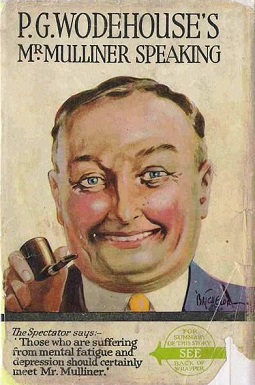
Mr Mulliner Speaking is a collection of nine short stories by P. G. Wodehouse. It was first published in the United Kingdom on April 30, 1929 by Herbert Jenkins, and in the United States on February 21, 1930 by Doubleday, Doran. The stories were originally published in magazines in the UK and the US between 1924 and 1929.

Jeffrey Ford is an American writer in the fantastic genre tradition, although his works have spanned genres including fantasy, science fiction and mystery. His work is characterized by a sweeping imaginative power, humor, literary allusion, and a fascination with tales told within tales. He is a graduate of Binghamton University, where he studied with the novelist John Gardner.
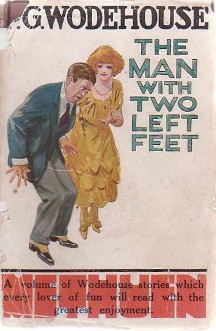
The Man with Two Left Feet, and Other Stories is a collection of short stories by British author P. G. Wodehouse, first published in the UK on 8 March 1917 by Methuen & Co., London, and in the US on 1 February 1933 by A. L. Burt and Co., New York. All the stories had previously appeared in periodicals, usually The Strand Magazine in the United Kingdom and The Red Book Magazine or The Saturday Evening Post in the United States.
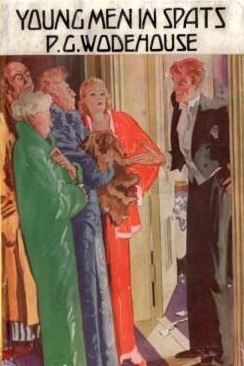
Young Men in Spats is a collection of short stories by P. G. Wodehouse, first published in the United Kingdom on 3 April 1936 by Herbert Jenkins, London, then in the United States with a slightly different selection of stories on 24 July 1936 by Doubleday, Doran, New York.
Written in the late 19th century by H. G. Wells and first published in The Butterfly, and collected in The Obliterated Man and Other Stories, "A Vision of Judgment" is a short story in 9 sections. It portrays a Last Judgment in which God and the archangel Gabriel laugh at sinners and saints alike, embarrassing them until they flee "up the sleeve of God." After every human soul has taken shelter there, all of humanity, "enlightened" and "in new clean bodies," is given a second chance. God shakes them—or rather us—"out of his sleeve upon the planet he had given us to live upon, the planet that whirled about green Sirius for a sun," saying "now that you understand me and each other a little better. . . . try again."

"The Crystal Egg" is a science fiction short story written by H. G. Wells in 1897.
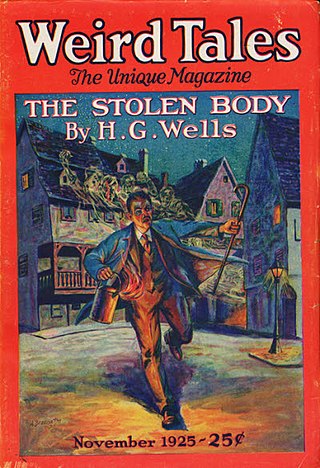
"The Stolen Body" is a science fiction short story by H. G. Wells that was originally published in The Strand Magazine ; collected in Twelve Stories and a Dream (1903) and Tales of the Unexpected (1924); reprinted in Weird Tales magazine and was later reprinted in many collections and anthologies.
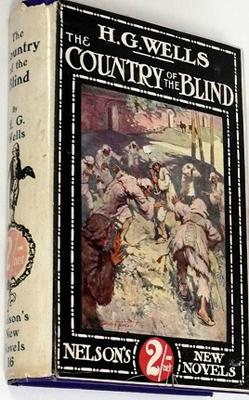
The Country of the Blind and Other Stories is a collection of thirty-three fantasy and science fiction short stories written by the English author H. G. Wells between 1894 and 1909. It was first published by Thomas Nelson and Sons in 1911. All the stories had first been published in various weekly and monthly periodicals. Twenty-seven of the stories had also been previously published in five earlier story collections by Wells.

H. G. Wells was a prolific writer of both fiction and non-fiction. His writing career spanned more than sixty years, and his early science fiction novels earned him the title of "The Father of Science Fiction".

Murder in the Dark is a collection of short fiction by Canadian author Margaret Atwood, published in 1983. Some of the pieces were previously published. The 27 pieces range over a variety of styles, including fictionalized autobiography, parables, travel stories, satires and prose poems. The pieces hold together through their major themes of loss, menace and terror, and men's abuse of power.
The Infinite Worlds of H. G. Wells is a four-hour television miniseries conceived by Nick Willing and released in 2001 by the Hallmark Channel. It is based on a number of short stories by H. G. Wells, and in some territories was titled The Scientist.

The Plattner Story and Others is a collection of seventeen short stories written by H. G. Wells. This volume was first published in March 1897 by Methuen & Co.

Dreaming Down-Under is a 1998 speculative fiction anthology edited by Jack Dann and Janeen Webb.

Demoted is a 2011 American comedy film directed by J. B. Rogers and starring Michael Vartan, Sean Astin, Celia Weston, David Cross, Billy West and Sara Foster.
 The Truth about Pyecraft public domain audiobook at LibriVox
The Truth about Pyecraft public domain audiobook at LibriVox 
















